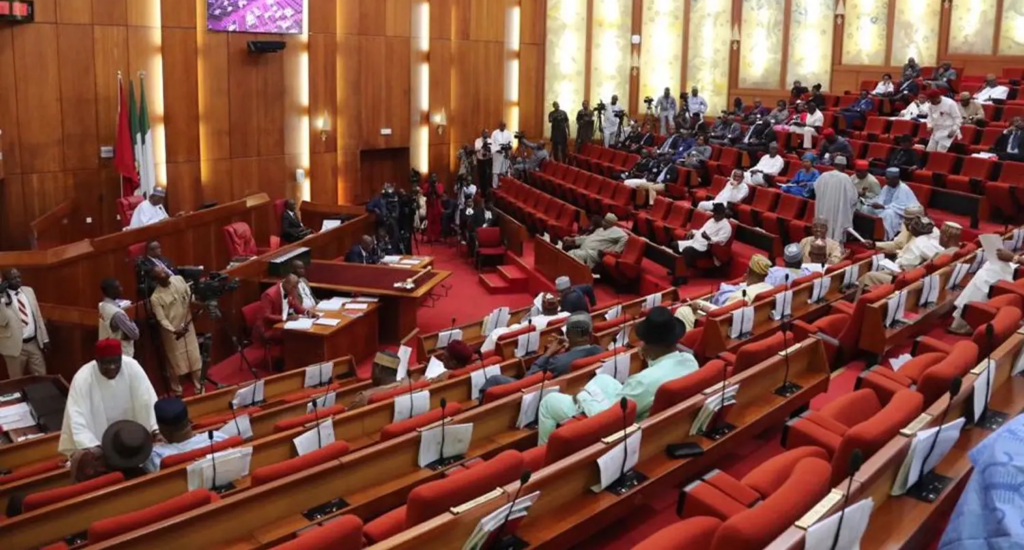A re-titled Bill on Control of Infection Diseases Bill 2020 was yesterday introduced in the Senate, following the outbreak of coronavirus or COVID-19 in the country.
This came as speaker of the House of Representatives and promoter of the bill, Femi Gbajabiamila, said yesterday that the bill would now be subjected to public hearing.
There had been outrage across the country over the fact that the bill passed second reading in the House of Representatives and was to also pass third without attempts to subject it to public hearing, before some vigilant members of the House scuttled the process.
During plenary in the Senate yesterday, a new bill, tagged National Health Emergency Bill, 2020, sponsored by the Chairman, Senate Committee on Primary Healthcare and Communicable Diseases, Senator Chukwuka Utazi, Peoples Democratic Party, PDP, Enugu North, was mentioned for first reading.
Soon after it was read for the first time by the Clerk of the Senate, Nelson Ayewoh, former Deputy President of the Senate, Senator Ike Ekweremadu, PDP, Enugu West kicked against it.
Ekweremadu, who came under Order 14(1) of the Senate Standing Orders as Amended, demanded for the draft copy of the Bill or in gazetted form, insisting that the content of the bill must be made open before subjecting it to any consideration.
The former deputy President of the Senate said a draft copy of the bill should be shared to lawmakers to enable them know whether it was the controversial bill or not.
Ekweremadu, in kicking against the bill, said his privileges and those of other senators would be breached if details of the contents were not made available to them before given further legislative consideration.
He said: “In line with Order 14(1), which has to deal with privileges, as one of the serving senators, I move that draft copies of the bill should be made available before any other legislative action is taken on it.
“This is very important because it would not augur well for the Senate to follow the same route with the House of Representatives where a controversial Bill on Control of Infectious Diseases was passed for first and second reading last week.
“Copies of the one that had just been passed for first reading in the Senate today (yesterday must be made available to us for required responses and contributions at the appropriate time.”
Meanwhile, there was strong indication that the Bill would be resisted by the senators as some of them alleged that the new bill might be a replica of the controversial bill currently before the House of Representatives, hence the need for senators to be provided with the draft copy.
President of the Senate, Senator Ahmed Lawan, immediately ordered that the bill be distributed to all senators and further ruled that the second reading would be taken next week at plenary, after all the senators woulld have perused and x-rayed the document.
Consequently, Lawan, directed the Sergeants at arms in the chamber to distribute copies of the bill to all senators ahead of its consideration for second reading next Tuesday.
Meanwhile, speaker of the House of Representatives, Femi Gbajabiamila said the bill, now being debated on the floor of the House, would be put to public hearing, following pressures from civil society organisations, CSOs and other stakeholders.
He said: “The Control of Infectious Diseases Bill will be put forward to a public hearing where stakeholders contributions will be sought to make improvements to the bill before it is reviewed and debated by the committee of the whole.
“It is from the accumulation of these myriad views, suggestions and good faith critiques from within and outside the House that we will arrive at final legislation that meets the present and future needs of our country, and which we all can support in good conscience.’’
He, however, disagreed with those who condemned the timing of the bill, insisting that it was appropriate to enact such a bill at this time.
The speaker also denied claims that the leadership of the House had received $10 million to pass the bill, decrying that the allegations were weighty, and that the House would take legal action.
“Suffice it to say that none of these allegations is true. Unfortunately, we now live in a time when conspiracy theories have gained such currency that genuine endeavours in the public interest can quickly become mis-characterised and misconstrued to raise the spectre of sinister intent and ominous possibility.”
